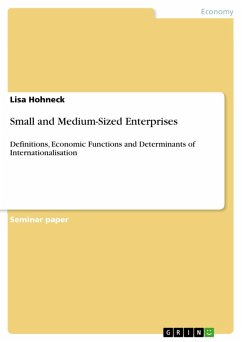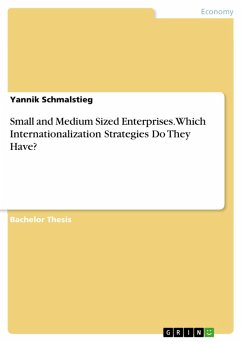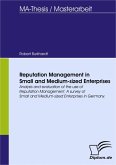Seminar paper from the year 2013 in the subject Business economics - Company formation, Business Plans, grade: 1,0, University of Applied Sciences Trier, language: English, abstract: Field of study: International Business/International Entrepreneurship Small and Medium-Sized Enterprises: Definitions, Economic Functions and Determinants of Internationalisation This study investigates a number of motives stimulating the internationalisation of small and medium-sized enterprises (SMEs).The internationalisation of SMEs usually is not part of a strategy but a reaction to a stimulus. An internationalisation stimulus is a factor fostering a firm's decision to start or maintain committing some resources to act on an international basis. The reaction to stimuli is an indicator for the flexibility of SMEs. It is an interesting point that flexibility helps small firms to overcome the lack of financial resources and is their advantage with regard to internationalisation. After dealing with different definitions of "small" and "medium" with regard to enterprize size and evaluating on the economic functions of smaller firms this work explains the ten following internationalization stimuli: - Potential for extra growth/sales/profit - Production of goods with unique qualities - Influence of decision maker - Orders from abroad - Saturation/shrinkage in domestic market - Intense competition of domestic market - Networking - Fulfilling an international need - Limitation of trade barriers - Global trade infrastructure
Dieser Download kann aus rechtlichen Gründen nur mit Rechnungsadresse in A, B, BG, CY, CZ, D, DK, EW, E, FIN, F, GR, HR, H, IRL, I, LT, L, LR, M, NL, PL, P, R, S, SLO, SK ausgeliefert werden.









